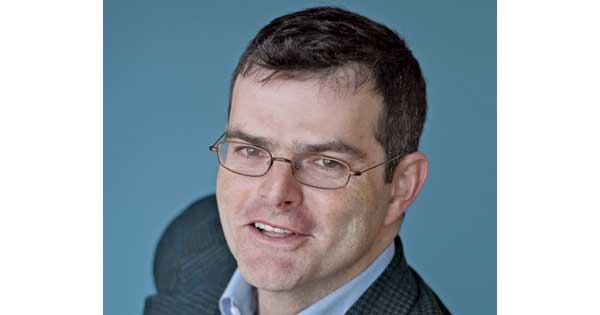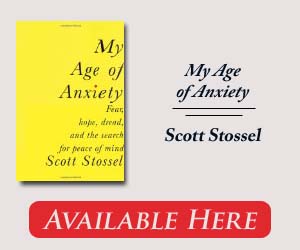
My Age of Anxiety: Fear, Hope, Dread, and the Search for Peace of Mind, by Scott Stossel, Knopf, 400 pp., $27.95
Poor Scott Stossel! He may be a high achiever (he’s the editor of The Atlantic), but for most of his 44 years, he has suffered from intense fear— of succeeding, of failing, of flying, of throwing up, of contracting a disease, of speaking in public, of being alone. His anxiety-sensitive digestive tract has turned his public appearances into an ordeal, a vacation in Italy into a tour of its restrooms, and a stay at the Kennedy mansion in Hyannis Port into a bathroom-defiling humiliation. He’s tried psychoanalysis, cognitive behavioral therapy, systematic desensitization, and insight-oriented therapy. He’s found himself in a basement lavatory, his belly full of ipecac, trying hard, under the watchful gaze of a Ratched-like nurse and a sympathetic but clueless psychologist, to vomit his way out of his fear of vomiting. He’s taken antipsychotic drugs, tranquilizers, antidepressants, alcohol, cocaine, and amphetamines, sometimes in dangerous combinations. And yet he is still, by his own account, often reduced to a quivering heap of worry, his guts in a stir, his brain on fire.
Stossel’s memoir of his affliction provides the narrative scaffolding on which he hangs a survey of current and past thinking about anxiety disorders. From Hippocrates and Galen through Robert Burton and Samuel Johnson, to Darwin and Freud, and on to the neurogeneticists and psychopharmacologists of the late 20th century, doctors and scholars have grappled with the questions posed by unremitting dread that seems to have no particular cause. Is anxiety a matter of what the ancients (and, increasingly, some moderns) called temperament, something inborn and immutable? Is it the legacy of genes? Faulty brain wiring? Bad parenting? Bad luck? Or just our existential condition?
Anxiety is a “riddle,” Stossel (borrowing from Freud) asserts—not only because it has no proximate object and seems impervious to even the most comprehensive and persuasive reassurances, but also (and more vexingly) because even after a few thousand years of examination, the tension between the competing accounts seems impossible to resolve. After a chapter-long discussion of the evolution of psychoanalytic thought about anxiety, Stossel concludes that the research “proves that my anxiety is largely a function of my childhood relationship with my mother.” You find yourself agreeing—and how could you not, when he recalls his mother’s hovering, smothering parenting style and includes an entry from a diary he kept as an 11-year old, which reads, I just feel like hiding my head and being hugged and loved by my mummy and daddy but they are not sympathetic about my fear at all.
But then he turns his story on a dime. “Except, of course, that it doesn’t prove anything of the sort,” he writes, before going on to deliver an equally comprehensive and persuasive account of the neurobiological and genetic explanations for anxiety, leavened by equally moving personal stories, including that of his great-grandfather’s debilitating anxiety and an anecdote about flying with his young daughter, who is “keenly attentive to every clank and whir from the aircraft’s innards, asking after each one if the noise meant that the plane was broken. … Sigh. The apple has fallen all too close to the tree.”
Stossel wants to leave nature and nurture in equipoise and offers his unrelenting anxiety, described in sometimes unbearable detail, as the best evidence of its ultimate mystery. Even as he explores anxiety as a medical disorder, he describes the conviction of theologians and philosophers like Saint Augustine, Søren Kierkegaard, and Paul Tillich that anxiety is “an abiding part of the human condition,” and he chronicles anxiety’s historical antecedents, especially the neurasthenia epidemic at the turn of the 20th century. Though he acknowledges the benefits of drug treatments, he gives the pharmaceutical and psychiatric industries a well-deserved spanking for the way they monger anxiety. And although he depicts some of his therapists as almost unbelievably incom- petent, he has been in therapy on and off for three decades and he clearly loves his current clinician, Dr. W.
But all these obsessively collected personal and historical details never quite cohere into an argument. His indeterminacy reads more like lack of commitment than negative capability—an outgrowth, perhaps, of his anxiety and a disorder that leaves its sufferers unable to fully believe or disbelieve their own strong feelings. Stossel doesn’t tell us how philosophy and history affect his understanding of his own suffering. We hear about the ancients, but we never learn whether he thinks Hippocrates’s anxiety was different from ours or believes that history assigns different meanings to emotions in different ages. He likewise never explains why he finds therapy valuable enough to have stuck with it for so many years—he leaves it to Dr. W. to tout its virtues. In the end, Stossel allows that his fretting may be the flip side of a conscientiousness that, even while “it often makes me miserable … is also, maybe, a gift.” But after 300 pages of confusion and misery, this conclusion seems like an afterthought.
 What rushes in to fill the vacuum left by Stossel’s vagueness is science, particularly medicine. Over and over again, Stossel uses the latest study of this neurotransmitter or that brain structure (he seems especially enamored of the amygdala) to shed light on his affliction. Despite his caviling, Stossel seems convinced that he suffers from a chronic illness, likely genetic in origin, a “handicap,” as he says near the end, that he must “manage—in part, he hopes, through the “empowering and anxiety reducing” process of writing a book.
What rushes in to fill the vacuum left by Stossel’s vagueness is science, particularly medicine. Over and over again, Stossel uses the latest study of this neurotransmitter or that brain structure (he seems especially enamored of the amygdala) to shed light on his affliction. Despite his caviling, Stossel seems convinced that he suffers from a chronic illness, likely genetic in origin, a “handicap,” as he says near the end, that he must “manage—in part, he hopes, through the “empowering and anxiety reducing” process of writing a book.
To anyone who has ever written a book (including Stossel, who is generous with his description of how he suffered while writing this one), this may sound crazy, but it is a kind of crazy that fits in perfectly with our current obsession with neuroscience. As brain scans have made shibboleths out of the most vaunted humanist convictions, and as our treasured notions of free will and self-determination have disappeared into the Prozac and Adderall haze, illness, and especially brain disease, has become our default narrative of psychospiritual suffering. Eschewing argument for survey and history for topography, Stossel’s memoir is a case history of a disease that medicine may eventually cure, but not without some cost to our humanity.

